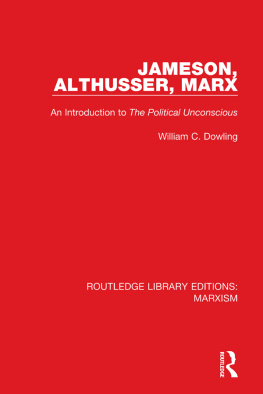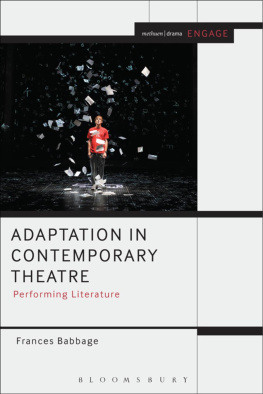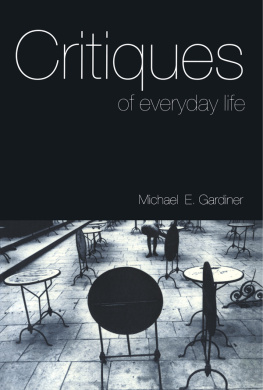Routledge Revivals
Carnival and Theater
In this title, first published in 1985, Michael Bristol draws on several theoretical and critical traditions to study the nature and purpose of theatre as a social institution: on Marxism, and its revisions in the work of Mikhail Bakhtin; on the theories of Emile Durkheim and their adaptations in the work of Victor Turner; and on the history of social life and material culture as practiced by the Annales school. This valuable work is an important contribution to literary criticism, theatre studies and social history and has particular importance for scholars interested in the dramatic literature of Elizabethan England.
Carnival and Theater
Plebian Culture and The Structure of Authority in Renaissance England
Michael D. Bristol
First published in 1985
by Methuen, Inc.
Paperback published in 1989
by Routledge
This edition first published in 2014 by Routledge
2 Park Square, Milton Park, Abingdon, Oxon, OX14 4RN
and by Routledge
711 Third Avenue, New York, NY 10017
Routledge is an imprint of the Taylor & Francis Group, an informa business
1985 Michael D. Bristol
The right of Michael D. Bristol to be identified as author of this work has been asserted by him in accordance with sections 77 and 78 of the Copyright, Designs and Patents Act 1988.
All rights reserved. No part of this book may be reprinted or reproduced or utilised in any form or by any electronic, mechanical, or other means, now known or hereafter invented, including photocopying and recording, or in any information storage or retrieval system, without permission in writing from the publishers.
Publishers Note
The publisher has gone to great lengths to ensure the quality of this reprint but points out that some imperfections in the original copies may be apparent.
Disclaimer
The publisher has made every effort to trace copyright holders and welcomes correspondence from those they have been unable to contact.
A Library of Congress record exists under LC control number: 85011426
ISBN 13: 978-0-415-75010-3 (hbk)
ISBN 13: 978-1-315-79569-0 (ebk)
CARNIVAL AND THEATER
PLEBEIAN CULTURE AND THE STRUCTURE OF AUTHORITY IN RENAISSANCE ENGLAND
MICHAEL D. BRISTOL
ROUTLEDGE
NEW YORK AND LONDON
First published in 1985 by
Methuen, Inc.
Paperback published in 1989 by
Routledge, an imprint of
Routledge, Chapman and Hall Inc.
29 West 35 Street
New York, NY 10001
Published in Great Britain by
Routledge
11 New Fetter Lane
London, EC4P 4EE
1985 Michael D. Bristol
All rights reserved. No part of this book may be reprinted or reproduced or utilized in any form or by any electronic, mechanical or other means, now known or hereafter invented, including photocopying and recording, or in any information storage or retrieval system, without permission in writing from the publishers.
Library of Congress
Cataloging in Publication Data
Bristol, Michael D., 1940Carnival and theater.
Bibliography: p.
Includes index.
1. English drama Early modern and Elizabethan, 15001600 History and criticism. 2. English drama 17th century History and criticism. 3. Authority in literature England. 4. Theater and society England. 5. England Popular culture. 6. TheaterPolitical aspects. 7. Politics and literature. I. Title.
PR658.A89B75 1985 822.309
85-11426
ISBN 0 416 35070 4
ISBN 0-415-90138-3 (pb)
British Library
Cataloguing in Publication Data
Bristol, Michael D.
Carnival and theater: plebeian culture and the structure of authority in
Renaissance England.
1. Theater England History
2. England Popular culture
I. Title
792'.0942 PN2585
ISBN 0 416 35070 4
ISBN 0 415-90138-3 (pb)
For Doris
CONTENTS
S OME of the ideas discussed in were originally presented under the title Carnival and the Institutions of Theatre in Elizabethan England, ELH, 50 (1983), 63755. The earliest source for the argument I have tried to work out here was the experience I had during the late 1960s with an experimental theater in Urbana, Illinois, called The Depot, Inc. That experience showed me what a theater might be as the expression of collective life and collective struggle, and Im happy now to reaffirm solidarity with my many friends and associates in that endeavor. In particular I would like to thank Professor James Hurt, whose performance as the first gravedigger in Hamlet provided me with a powerful image of the themes developed here.
I wish to thank my unfailingly contentious colleagues at McGill for the opportunity to discuss the issues addressed here, especially Professors Darko Suvin, Leonore Lieblein, John Ripley, Michael Maxwell, Irwin Gopnik, Kate Shaw, and George Szanto. For advice, encouragement, and practical aid and comfort I would like to thank Charles Frey, Donald Hedrick, Barbara Mowat, Nancy Hodge, Terence Hawkes, and Naomi Liebler. Don Bouchard, Paisley Livingston, and Benjamin Weems read early versions of the manuscript, and, although I dislike criticism, especially when it is constructive, I am obliged to admit that their refusal to understand has made this a better book. At a later stage the text was read by Maurice Charney, Stephen Orgel, and Walter Cohen. The editorial comments and suggestions of this heterogeneous readership have helped me to incorporate important second thoughts and have also kept me mindful of why I wanted to do this in the first place. The sense of community I have experienced in working with and against the members of this diverse group has been the most personally rewarding part of the project for me, and I hope that this at least is reflected in the final result.
The Social Science and Humanities Research Council of Canada provided me with a generous research grant to carry out this project. I would like to express my appreciation for that support, and for the support provided by McGill University in the form of a sabbatical leave. Hectorine Leger typed the manuscript and corrected my French. Final editing and proofreading have been done with the highly professional assistance of Marta Meanna.
Doris Bristol has faithfully kept me company through all the struggles; she has sustained me with a truly serio-comic attitude to my efforts and, always, with love.
THEORETICAL PERSPECTIVE
The social and political life of the theater as a public gathering place has an importance of its own over and above the more exclusively literary interest of texts and the contemplation of their meaning. Because of its capacity to create and sustain a briefly intensified social life, the theater is festive and political as well as literary a privileged site for the celebration and critique of the needs and concerns of the polis. The critical intensification of collective life represented and experienced in the theater, and the possibility it creates for action and initiative, is the subject of this book.
The richest material for the elaboration of the argument pursued here is the dramatic literature of Renaissance England and its complex relationship to the traditions of Carnival. For most of its more recent history, theater has functioned with a diminished capacity to achieve its social and political purpose. In Renaissance England, however, the theater objectified and recreated broadly dispersed traditions of collective life that were also represented and disseminated through anonymous festive manifestations such as Carnival. The dramatic literature produced by this theater retains much of the power and the durable vitality of these strong political forms. Unlike the theater of later periods, that of Elizabethan and Jacobean England is not exclusively or even mainly a specialized institution of literary production and consumption. In this theater, literature as







